Uplifting Black Midwestern Voices Through Academics, Art, and Activism
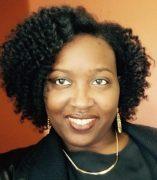
During the 2016 presidential election cycle, Dr. Terrion Williamson noticed that when candidates were attempting to capture the vote of the ‘heartland laborers,’ these folks were often scripted as white and male. This erasure of Black folks from the Midwest—both from the public discourse and the historical archive—troubled her. Unfortunately, it was a familiar feeling.
An associate professor at the University of Illinois Chicago (UIC) in Black Studies and Gender & Women’s Studies, Dr. Williamson teaches on the subjects of Black feminism, Black cultural studies, and racialized gender violence. Her work is deeply personal: currently, she is writing a book about the story of nine Black women who were killed in her hometown of Peoria, Illinois between 2003 and 2004. It is a story many years in the making—Williamson started analyzing the cases as a graduate student at the University of Southern California. While conducting her research, Williamson noticed a dearth of academic scholarship focused on the Black experience in the greater Midwest and Rust Belt region, outside of major urban areas.
“There's a pretty deep literature on Chicago and on Detroit, but beyond those two places, it starts to thin out pretty dramatically,” Williamson reflected. “The histories and stories and literature of Black folks in other parts of the region were being told less. Or when they were being told, they were not being told by the people who were most deeply affected by them, which is to say, they were not being told by Black folks in their own community.”
What it means to talk about justice
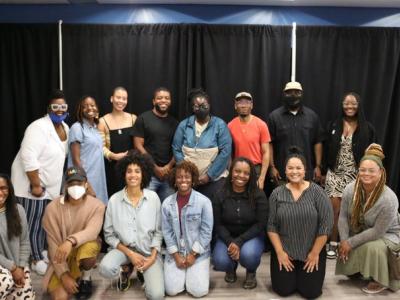
Photo credit: The Black Midwest Initiative
In response, Williamson created The Black Midwest Initiative (BMI) in 2017, an organization for people in community with one another, folks who cared deeply about—and identified with—the Black Midwestern experience. These were folks who wanted to tell, archive, and contribute to the conversation around Black Midwestern Studies. As the BMI evolved, Williamson did not have strict organizational guidelines. Her vision, however, was clear: to think beyond the walls of the university.
The university is the primary location for the work that the BMI does, and Williamson stressed that it is an important locale for training scholars in thinking about their communities. As a first-generation college student from a working-class Black community, Williamson also recognized that she was educated by folks who have never set foot on a college campus. Through her work with BMI, Williamson is engaged and in relationship with community members, which also includes visual artists, performance artists, and literary artists.
“We believe that you can't talk about Black freedom if you're not talking about us in our fullness, which obviously includes the arts,” Williamson explained. “[It] gives us another way of thinking about what it means to talk about justice. The three pillars of our work are academics, art, and activism, which is a way of gesturing toward all three of those points and trying really hard to find a way to be in equal relationships with all three pillars.”
For Williamson, who lives on the south side of Chicago, there is no separation between working with and being part of her community. In fact, she actively resists the rhetoric that her work with BMI “gives back” to the community. This narrative misses the point: communing with folks and being in fellowship is not transactional, nor is it one-sided. Instead, Williamson and the other members of BMI actively work to co-create an organizational model that supports reciprocal relationships, which includes—among other things—taking into consideration when folks outside of academic settings are available for meetings.
Building capacity for community-based work
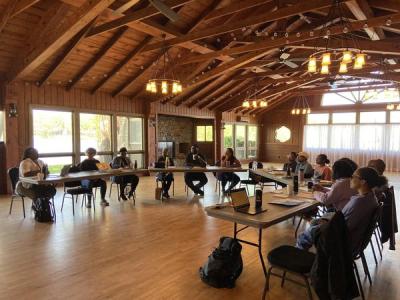
Photo credit: The Black Midwest Initiative
At its core, BMI is a regional organization, one that is continuing to build its capacity. On the ground at UIC, Williamson is part of an administrative team that includes herself, a graduate assistant, and a financial manager. While she hopes to build an advisory committee and conduct a membership drive in fall 2023, Williamson recognizes that, at present, there are financial and geographic limitations that impact the BMI community’s ability to regularly gather in-person.
That’s why the BMI summer retreat—which brought together partners from across the greater Midwest— was supported, in part, by Humanities Without Walls Grand Research Challenge project funding. BMI is one of the collaborators on the project “Black Study and Creative Praxis in the Midwest,” along with Sinclair Community College, Dayton Metro Library, Central State University, Dayton Contemporary Dance Company, Belt Publishing, and Obsidian Literature & Arts in the African Diaspora. In October 2024, the project organizers will host the Third Biennial Black Midwest Symposium in Dayton, Ohio.
Williamson shared that HWW funding also supported the BMI’s inaugural Summer Institute, which was held at the University of Illinois Chicago July 17-21, 2023. This institute was a pilot project, something that the BMI had been wanting to do for a long time.
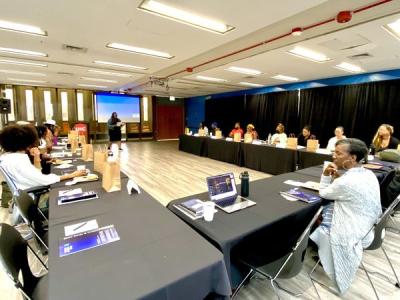
Photo credit: The Black Midwest Initiative
“We wanted to bring emerging scholars, emerging artists, early career folks from those three different pillar areas together with people who had more established careers,” Williamson said. “[We wanted] to see what happens when you have a wide range of interests and practices together, but with the common theme being that they're folks who are from, care about, and [are] doing work in and on the Midwest and see what kind of work emerges from that.”
What emerged: 65 Black scholars, artists, and community organizers submitted applications for 15 fellowship positions. When the deadline came, Williamson and the selection committee had to cut off incoming submissions. The number of submissions proved something vital, according to Williamson and her co-conspirators. Brilliant, necessary, community-sustaining work was happening in the Black Midwest.
Sonic textures of Black livingness

Photo credit: Roderick E. Jackson
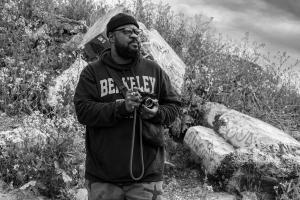
Photo credit: Roderick E. Jackson
april l. graham-jackson was one of the 15 fellows selected to participate in the 2023 BMI Summer Institute. A PhD candidate at the University of California Berkeley, graham-jackson is a Berkeley Black Geographies Fellow and a proud third-generation Black Chicagoan (her family’s roots in Chicagoland date back to the 1950s). Together with her husband Roderick E. Jackson (also a 2023 BMI Fellow and PhD student at Berkeley), they collaborated on the project Black Chicagoland is…, which explored the interplay between the sound, music, and visual textures of Black livingness in the Chicago Metropolitan Area and was supported by a Mellon Foundation Black Studies Collaboratory grant through the African American Studies Department at UC Berkeley.

Photo credit: Roderick E. Jackson
For graham-jackson, she hesitated when applying for BMI Summer Institute, knowing that the concept of Black Chicago dominated the prevailing interpretation of Black life across the greater Midwest, both within the public discourse and in scholarly literature in the field of Black Midwest Studies. However, she found that being in conversation with the BMI Summer Institute Fellows affirmed and provided a “positive disruption” to her work, identity as a Black Chicagoan, and subsequently, her research as a geographer and geosonicologist.
“We engaged in critical conversations about Black Chicago’s dominance in the Midwest, how we might think about Black Chicago differently, the commonalities and differences within the Black Midwest and how geography and creativity complicate that knowing,” graham-jackson shared. “We were introduced to various methods and methodologies that offered new approaches to gathering and preserving information about Black Chicagoland.”
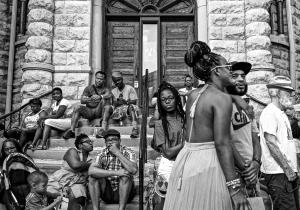
Photo credit: Roderick E. Jackson
As a result of her BMI experience, graham-jackson was reminded to tell the story of her research “through the people who lived it.” BMI provided funding for travel, equipment, and professional development opportunities for the “Black Chicagoland is…” team to learn about different ways to continue building a sonic archive for their project. Recorded by graham-jackson and her husband, the Black Chicagoland archive includes voices of residents and sonic textures of Black communities, to represent, according to graham-jackson, “the sonic identity of places that make them feel and sound Black.” The archive will preserve the fullness of Black spaces in neighborhoods that are increasingly gentrified, as an auditory resource to enable Black people to understand their environments past, present, and future.
graham-jackson and Jackson exhibited their work “Black Chicagoland is…” at the Worth Ryder Art Gallery at UC Berkeley, with support from BMI. They will be part of the Third Biennial Black Midwest Symposium in 2024. Their work will be on display at the Dayton Metro Library.
Speaking in a different register
How best to encapsulate the vibrancy of this work? Williamson edited an anthology called “Black in the Middle: An Anthology of the Black Midwest” with Belt Publishing in 2020. Williamson is working to develop a second anthology, along with other BMI co-collaborators. The anthologies, according to Williamson, were designed to both bridge the gap of work around the Black Midwestern experience and reflect the diversity and depth of Black experiences in the region.
“Instead of having long scholarly articles, [the anthologies have] shorter essays. It means that the people who write those essays are writers, they're independent authors. There are a few scholars, but it’s not a book of them,” Williamson shared. “There’s poetry there. There is visual art there. The idea is to reach to hear and listen to and be in relationship and conversation with all kinds of different work…to reach a wide range of people.”
Black in the Middle, in particular, spoke to a woman named Debi Chess, who had moved back to the Midwest after living in Arizona. She picked up the text, and according to Williamson, had an “aha” moment. The anthology affirmed for her what it meant to be Black. It made her feel seen. Chess felt called to lift up her community in Dayton, Ohio and contacted Williamson at BMI. Her goal? To lead the organizational charge and host the Third Biennial Black Midwest Symposium in Dayton in 2024. It worked. Williamson directly attributed Chess’s success to the intentional format of the first anthology.
“We would not have reached her had it not been for that book. I don't know that they would have attended to it in the same way if it had been an academic journal,” Williamson theorized. “The work is still very deep, the work is still very smart, the work is still very compelling, but it speaks in a different register.”
There is space for you here
Williamson is mindful of expanding the BMI’s networks—and keeping the circle open to all. The BMI will build relationships in central Ohio and elsewhere in the region. Williamson and other BMI members will also continue to model reciprocal relationship building, lifting up under-resourced, working-class Black communities that have rich artistic and organizational histories in the Midwest. The work continues.
For the upcoming symposium in Dayton, the fifteen BMI Summer Institute Fellows will be given a stipend to attend and present their creative projects. Unlike a typical symposium, Williamson and the organizers are subverting traditional formats: the event will include poetry readings, film screenings, and roundtable discussions. They have left it open-ended for the Fellows to imagine what they would like to do. Symposium ticket prices do not cover operational costs. There are solidarity rates available—allowing for completely free registration—to encourage attendance. These details send a message. Williamson puts it plainly: “Come, there is space for you here.”
Published on November 6, 2023